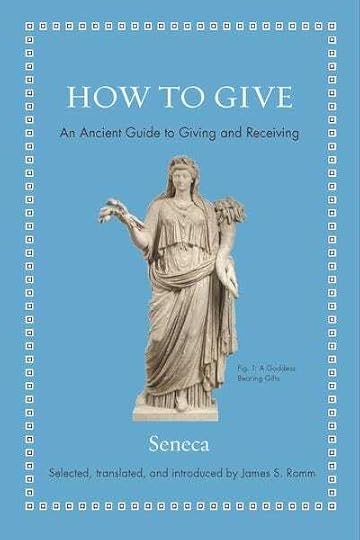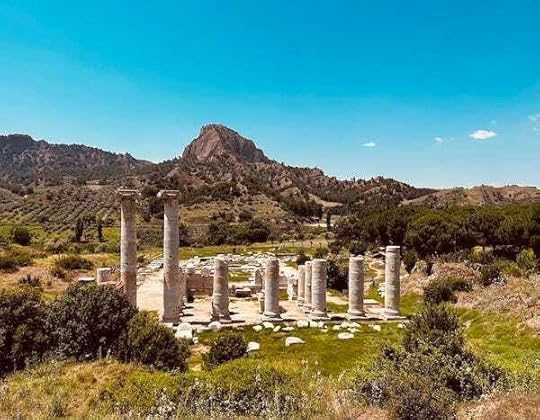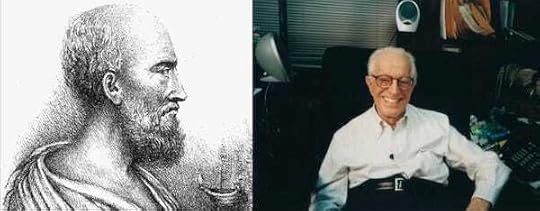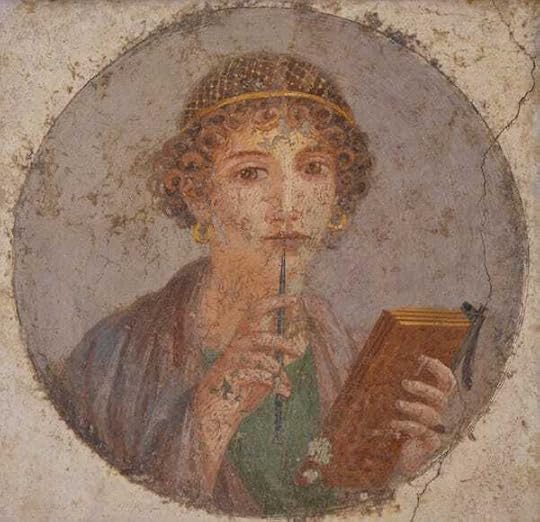Massimo Pigliucci's Blog, page 25
October 13, 2023
Should we be skeptical of religion?
 “Cruise the cosmos,” image from mdsci.org.
“Cruise the cosmos,” image from mdsci.org.I grew up Catholic in Rome, Italy. My apartment wasn’t too far from the Vatican, as I was reminded every Wednesday morning on my way to class at the University: the bus would invariably be slowed down to a crawl by the traffic associated with the Pope’s open audience with his flock.
By that time, however, I had already left the Church for a position that Bertrand Russell would have characterized as “agnostic with an inclination toward atheism.” A strong i...
October 11, 2023
Video chat: Robin Waterfield on Plato
 Robin Waterfield
Robin WaterfieldDear Readers,
With this newsletter I begin an occasional series of video chats with authors and translators who have written about the philosophy, culture, and history of the Greco-Roman tradition. I hope you’ll enjoy them!
Cheers,
Massimo
In this episode of “Meet the Greco-Romans” I talk to Robin Waterfield, one of the top scholars and translators of Greco-Roman thought.
Robin was born in England in 1952, and received a traditional British private education, which instilled in him a ...
October 9, 2023
How to give with Seneca

[Based on How to Give: An Ancient Guide to Giving and Receiving, by Seneca, translated by James M. Romm. Full book series here.]
I bet you didn’t realize that gift giving and receiving has a moral dimension, did you? At least, most of us nowadays are used to think of morality, or ethics, as having a rather specific and narrow domain: it is concerned with whether a particular action is right or wrong, and gifts rarely, if ever, seem to deserve that much attention.
But the ancient Greco-Romans under...
October 6, 2023
A visit to the Cryptozoology Museum
 The entrance to the International Cryptozoology Museum in Portland, Maine. Photo by the Author.
The entrance to the International Cryptozoology Museum in Portland, Maine. Photo by the Author.A few weekends ago I went with my wife and two dear friends to Portland, Maine, for a bit of rest and relaxation. We visited the lighthouse, walked by the waterfront, checked out the art museum, and ate and drunk more than usual in some of the fine local establishments.
Also, we went to the International Cryptozoology Museum. Given my interest in pseudoscience, I just couldn’t resist, and my friends hap...
October 4, 2023
The School for a New Stoicism
 The Temple of Artemis at Sardis, photo by Massimo Pigliucci.
The Temple of Artemis at Sardis, photo by Massimo Pigliucci.It may not look like it from the volume of material produced by my writing, podcasting, and video producing. But I’m actually fairly new to Stoicism and Greco-Roman practical philosophy. In fact, it all started in the midst of my mid-life crisis, back in 2014.
I had been looking for a while for philosophical resources to help me overcome some of life’s setbacks, as well as to guide me through a change of profession (from biology to philo...
October 2, 2023
Plato on knowledge vs inspiration
“SOCRATES: And when you make a judgement about military matters, do you judge in virtue of your skill in generalship, or in virtue of the skill that makes you a good rhapsode?
ION: There’s no difference, so far as I can see.
SOCRATES: No difference? How on earth can you say that? Are you saying that the skill of a rhapsode and the skill of a general are one skill, or two?
ION: One, I think.
SOCRATES: So, anyone who’s a good rhapsode is in fact a good general too?
ION: Certainly, Socrates. …
SOCRATES: ...
September 29, 2023
Going to the Stoic Mind Gym
 Epictetus (left) and Albert Ellis (right).
Epictetus (left) and Albert Ellis (right).Stoicism is a philosophy of life. Cognitive Behavioral Therapy (CBT) is a type of psychotherapy. The latter began with the work of Albert Ellis in the 1950s, and Ellis was directly inspired by Stoic writings, especially those of the second century slave-turned-teacher Epictetus of Hierapolis.
In particular, Ellis was motivated by a crucial passage in Epictetus’s Enchiridion, or manual for a good life. He cites this passage in the second edition of his boo...
September 27, 2023
Suggested Readings
 Woman with wax tablets and stylus (so-called "Sappho"), Naples Archeological Museum
Woman with wax tablets and stylus (so-called "Sappho"), Naples Archeological MuseumHow to live a happy life, with Seneca. What makes for a happy life? That depends on what sort of living organism one is. For a cactus, a happy life consists in access to the right set of soil and air nutrients, plenty of light, and a bit of water. Oh, and staying away from parasites and predators (hence the spines). For a human being things are a bit more complicated. Combined biology and culture make for an incre...
September 25, 2023
Cicero on the fact that death doesn’t deprive us of anything
“Who is there, then, that does not lament the loss of his friends, principally from imagining them deprived of the conveniences of life? Take away this opinion, and you remove with it all grief; for no one is afflicted merely on account of a loss sustained by himself.
Perhaps we may be sorry, and grieve a little; but that bitter lamentation and those mournful tears have their origin in our apprehensions that he whom we loved is deprived of all the advantages of life, and is sensible of his loss. ...



